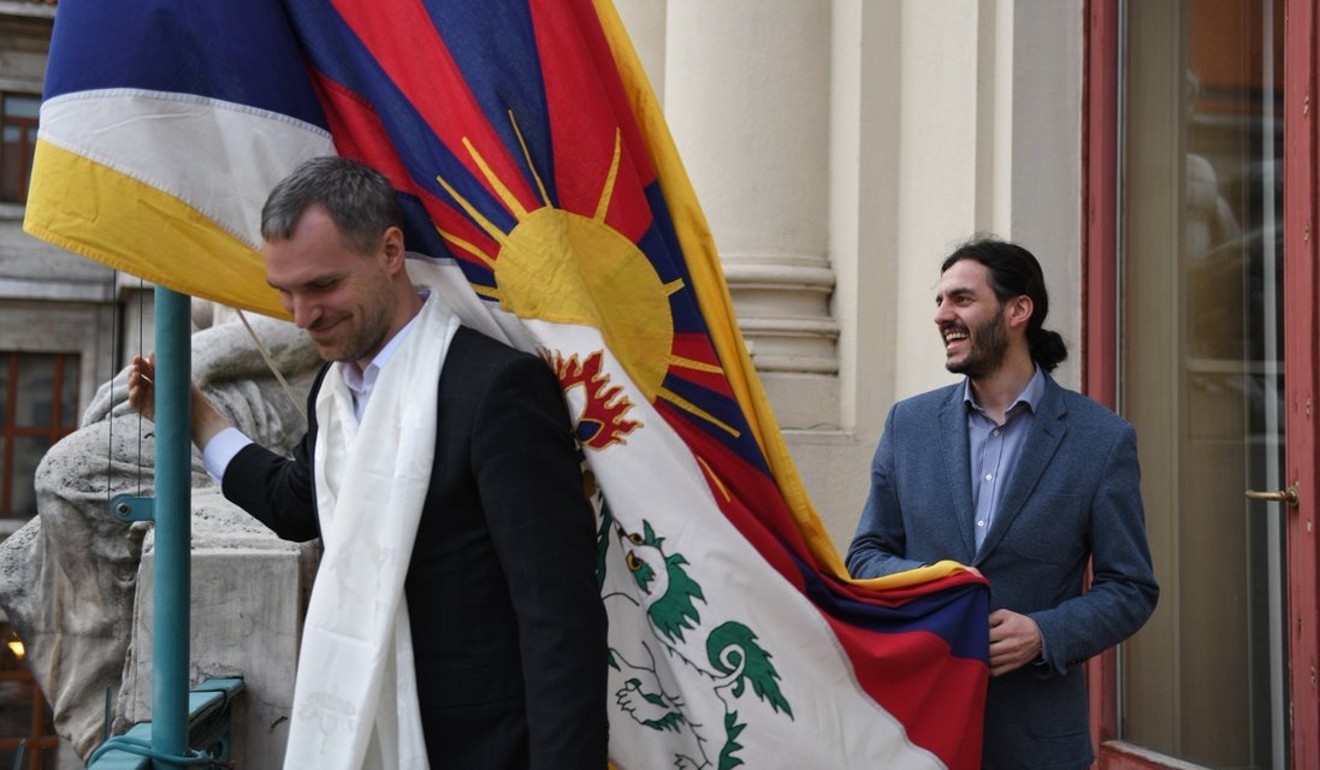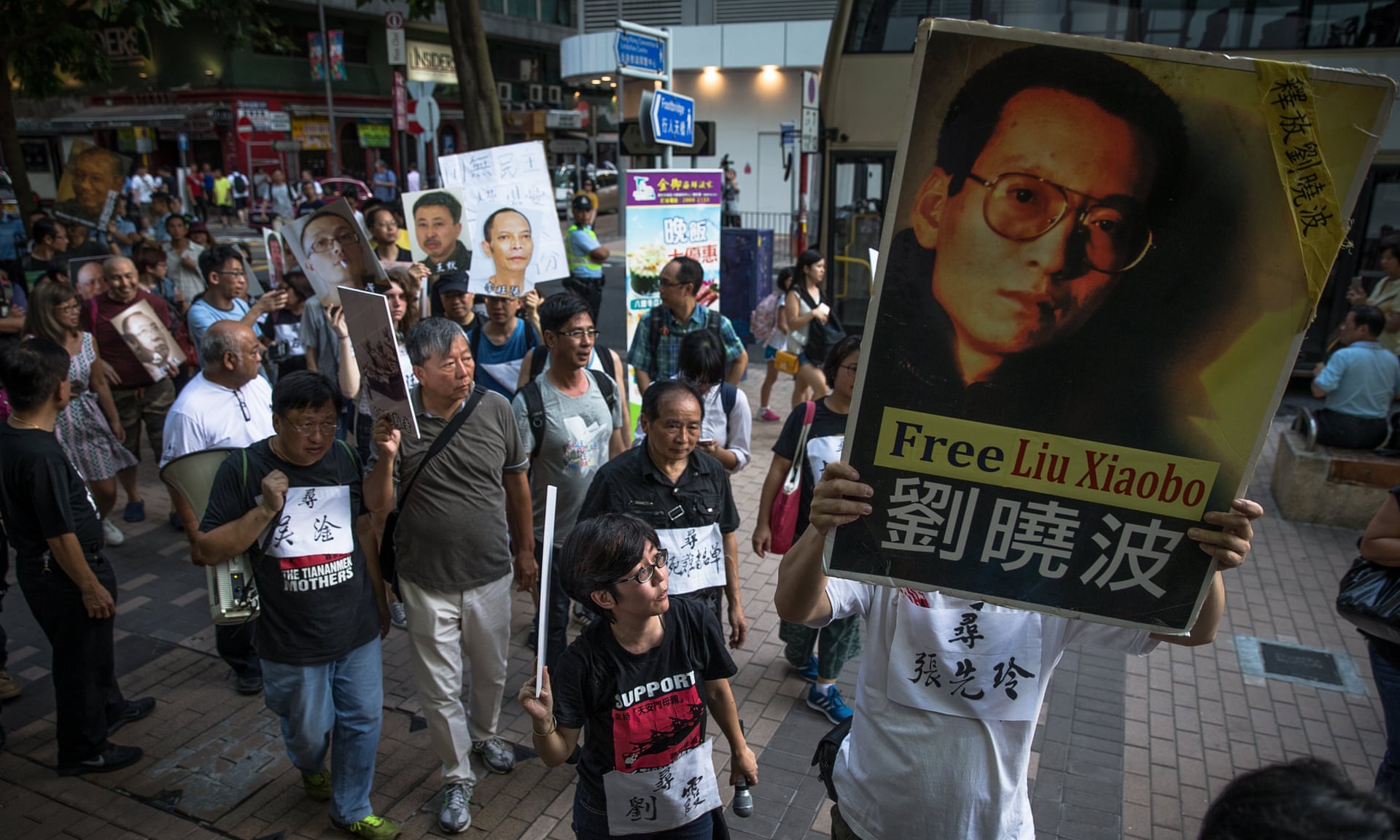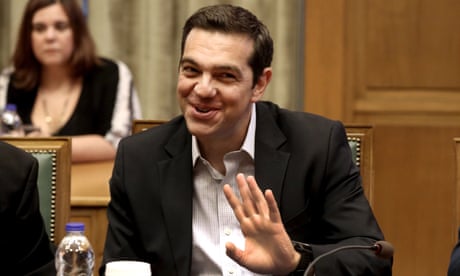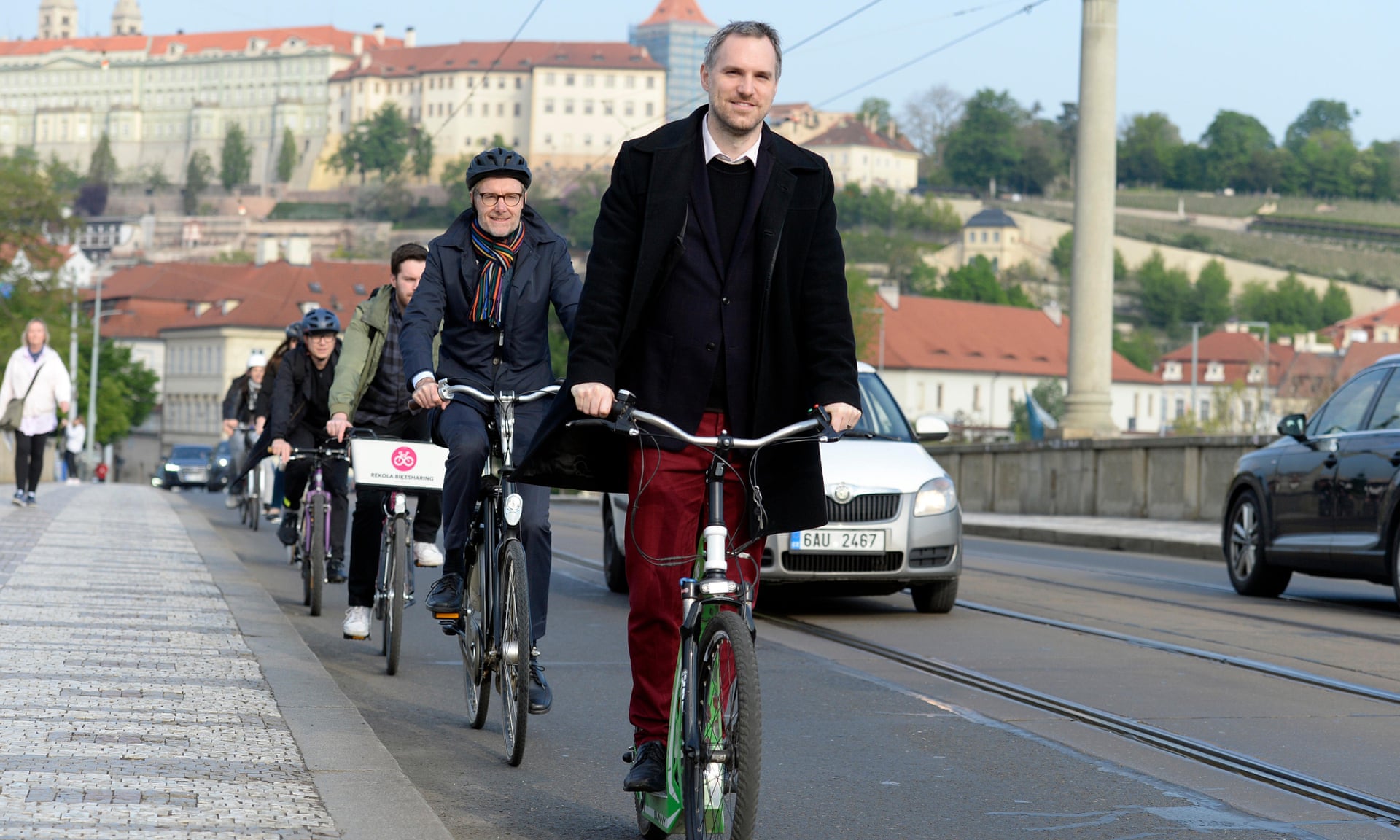Prague security services say China poses major threat as Czech billionaire's loan firm launches propaganda campaign to burnish Beijing’s image
By Robert Tait
Liberal Prague mayor Zdeněk Hřib, who refused to abide by Beijing’s One China policy, which recognises China’s claim to Taiwan.
The Czech Republic’s richest man is at the centre of a foreign influence campaign by the Chinese government after one of his businesses financed an attempt to boost China’s image in the central European country.
In a development that has taken even seasoned sinologists aback, Home Credit – a domestic loans company owned by Petr Kellner that has lent an estimated £10bn to Chinese consumers – paid a PR firm to place articles in the local media giving a more positive picture of a country widely associated with political repression and human rights abuses.
Home Credit also funded a newly formed thinktank – headed by a translator for the Czech Republic’s pro-Chinese president, Miloš Zeman – to counteract the more sceptical line taken by a longer-established China-watching body, Sinopsis, linked with Prague’s Charles University, one of Europe’s oldest seats of learning.
Experts say the moves, revealed in an investigation by the Czech news site Aktualne, bear the hallmarks of a foreign influence campaign by China that highlights its aggressive attempts to gain access to former communist central and eastern European countries through its ambitious “belt and road” initiative, under which it offers to fund infrastructure projects in those states.
According to analysts, the Czech Republic has been more open to Chinese influence than most other European countries, a situation that has coincided with the burgeoning commercial relationship between China and Kellner’s sprawling PPF group, which boasts an estimated £40bn in assets, including Home Credit.
PPF began accumulating its vast wealth in the mass privatisation of state assets that followed the fall of communism in the former Czechoslovakia in 1989.
Home Credit is currying favour with the Chinese regime in an effort to protect its interests after a series of political disputes between China and the Czechs that cooled previously warm bilateral relations.
Home Credit has acknowledged paying the PR firm, C&B Reputation Management, and backing Sinoskop, the thinktank, to try to bring “greater balance” to debate about China.
“Discussion of China in the Czech Republic had become one-sided, relentlessly negative and poorly informed,” Home Credit’s spokesman, Milan Tomanek, told the Observer.
Martin Hala, a lecturer at Charles University’s Sinology department and director of Sinopsis, said: “The bottom line is that Home Credit hired this company not to defend their own corporate interests per se, but rather to promote the narrative coming from the People’s Republic of China and the Chinese communist party.
“The first goal is to normalise China, presenting it not as a dictatorship but as a country, like any other, that is opening up to reforms. I don’t think that’s an accurate picture.”
The revelations coincide with a recent warning by the Czech intelligence service, BIS, that Chinese influence campaigns pose a greater threat to national security than meddling by the Russian government of Vladimir Putin.
“The BIS considers primarily the increase in the activities of Chinese intelligence officers as the fundamental security problem,” the report says.
“These activities can be clearly assessed as searching for and contacting potential cooperators and agents among Czech citizens.”
Czech ties with Beijing grew closer after 2014 when the regime granted Home Credit a nationwide licence to offer domestic loans, the first foreign company to be given the right.
This would only have happened on the understanding that Home Credit would work to ensure favourable coverage of China in the Czech media and political discourse.
It heralded several trips to China by Zeman, who is close to Kellner, and culminated in a state visit in 2016 by the Chinese dictator Xi Jinping to Prague.
The rapprochement – which also saw the purchase of a Czech brewery, television station and Slavia Prague football club by a Chinese energy company, CEFC – reversed the policy adopted by the late Václav Havel, the Czech Republic’s first post-communist president who had championed human rights, and the Dalai Lama, the exiled spiritual leader of Tibet.
But relations began to sour last year when the Czech government of prime minister Andrej Babiš, acting on advice from the country’s cybersecurity agency, banned Huawei phones from ministerial buildings, prompting Chinese protests and a rebuke from Zeman, who accused the security services of “dirty tricks”.
They took a further turn for the worse when Prague’s liberal mayor, Zdeněk Hřib, refused to abide by the One China policy – recognising China’s territorial claim to Taiwan – accepted by his predecessor as part of a twinning arrangement between the Czech capital and Beijing.
In retaliation, China scrapped the agreement and cancelled a planned tour of the country by the Prague Philharmonia.
Amid the rows, criticism began to appear in Chinese state media of Home Credit’s lending practices, accompanied by several failures in court to fully recover unpaid debts.
That has fuelled speculation that the company began to fear for the future of its interests in China.
When Sinopsis reported the Chinese media criticism on its website, it received a “cease and desist” legal warning from Home Credit which threatened to sue unless in the absence of an apology.
The company accuses Sinopsis of failing to correct “misleading or incorrect statements”.
Home Credit had earlier abandoned a £50,000 sponsorship deal with Charles University – which foreswore each institution from damaging the other’s good name – after a backlash from academics, who feared it would muzzle any criticism of China.
Now critics see a new threat, from PPF’s recent £1.62bn purchase from AT&T of Central European Media Enterprises (CME), a company which includes the Czech Republic’s most-watched commercial TV station, Nova, as well as channels in neighbouring countries.
PPF has dismissed warnings about potential political interference in the station’s output but some are sceptical.
“PPF negotiated this deal saying that they would never meddle in politics,” said Petr Kutilek, a Czech political analyst and human rights activist.
“But from the Home Credit affair, you actually see them meddling in politics.”
Affichage des articles dont le libellé est Václav Havel. Afficher tous les articles
Affichage des articles dont le libellé est Václav Havel. Afficher tous les articles
lundi 6 janvier 2020
vendredi 11 octobre 2019
In the Spirit of Václav Havel
Prague city council moves to axe partnership with Beijing
By Jan Lopatka

Prague mayor Zdenek Hrib tweeted this image of himself on March 9, 2019, raising the Tibetan flag at the Czech capital’s town hall.
PRAGUE -- Prague city council voted on Monday to cancel a partnership agreement with Beijing after it failed to remove an article requiring it commit to the “one China” principle, which refers to China’s stance that Taiwan and it both belong to one China.
The city’s leadership, elected last year, says it is non-standard for city-to-city partnerships such as the one signed by the previous administration in 2016, to include diplomatic matters that are up to national governments.
“Unfortunately, the Chinese side did not respect our opinion that we do not want the political article, so the negotiations did not lead anywhere,” council member Hana Kordova Marvanova.
“For us this is also a gesture that we do not want to declare subservient attitude to the authoritarian regime in China.”
The decision must still be approved by the city assembly, where parties backing the executive council have a majority.
The spat between Prague and Beijing, which has been rumbling throughout the year, has soured ties between the two countries, which have in recent years tried to build a stronger political and business relationship.
Chinese authorities have already canceled tours of several Czech musical groups to China that had some link to Prague.
The Czech ties to China have been pushed mainly by Milos Zeman, who has frequently visited China and backed investments by Czech lender Home Credit there, as well as Chinese telecoms firm Huawei’s business in the Czech Republic.
New agency CTK reported Czech Foreign Minister Tomas Petricek said foreign policy was determined by the government and it maintained its position on China, although it respected the council’s decision.
By Jan Lopatka

Prague mayor Zdenek Hrib tweeted this image of himself on March 9, 2019, raising the Tibetan flag at the Czech capital’s town hall.
PRAGUE -- Prague city council voted on Monday to cancel a partnership agreement with Beijing after it failed to remove an article requiring it commit to the “one China” principle, which refers to China’s stance that Taiwan and it both belong to one China.
The city’s leadership, elected last year, says it is non-standard for city-to-city partnerships such as the one signed by the previous administration in 2016, to include diplomatic matters that are up to national governments.
“Unfortunately, the Chinese side did not respect our opinion that we do not want the political article, so the negotiations did not lead anywhere,” council member Hana Kordova Marvanova.
“For us this is also a gesture that we do not want to declare subservient attitude to the authoritarian regime in China.”
The decision must still be approved by the city assembly, where parties backing the executive council have a majority.
The spat between Prague and Beijing, which has been rumbling throughout the year, has soured ties between the two countries, which have in recent years tried to build a stronger political and business relationship.
Chinese authorities have already canceled tours of several Czech musical groups to China that had some link to Prague.
The Czech ties to China have been pushed mainly by Milos Zeman, who has frequently visited China and backed investments by Czech lender Home Credit there, as well as Chinese telecoms firm Huawei’s business in the Czech Republic.
New agency CTK reported Czech Foreign Minister Tomas Petricek said foreign policy was determined by the government and it maintained its position on China, although it respected the council’s decision.
The Czech government adheres to the one China principle.
The Chinese Embassy in Prague said last month that the cause of the clashes was on the Czech side. It said Prague city hall had “very negative” effects in affairs related to China’s "sovereignty", and this undermined the atmosphere in bilateral relations.
The embassy did not immediately answer a request for comment on Monday.
Czech-Chinese relations have already been dented by a warning last year by the Czech cyber-security watchdog against risks of using equipment made by China’s Huawei and ZTE in critical infrastructure.
Expectations of billions of dollars worth of Chinese investments in the country have also not materialized.
The Chinese Embassy in Prague said last month that the cause of the clashes was on the Czech side. It said Prague city hall had “very negative” effects in affairs related to China’s "sovereignty", and this undermined the atmosphere in bilateral relations.
The embassy did not immediately answer a request for comment on Monday.
Czech-Chinese relations have already been dented by a warning last year by the Czech cyber-security watchdog against risks of using equipment made by China’s Huawei and ZTE in critical infrastructure.
Expectations of billions of dollars worth of Chinese investments in the country have also not materialized.
samedi 1 juillet 2017
The EU must stand up to China
The scandalous treatment of Nobel prizewinner Liu Xiaobo means Europe has to challenge Xi Jinping over human rights at next week’s G20 summit
By Natalie Nougayrède

Next week Donald Trump and Xi Jinping travel to Europe for a G20 summit in Hamburg.

Liu Xiaobo (left) is fed to by his wife, Liu Xia, in a hospital in China. Last month he was diagnosed with liver cancer, and his request to travel abroad for treatment has been denied.
It’s easy to ascribe this to the cynicism that comes with protecting business interests: China is an important economic partner for Germany, and its political leverage increases with every investment or buy-up it secures in other European countries too.

By Natalie Nougayrède

A pro-democracy protest in support of Liu Xiaobo and other jailed activists, in Hong Kong yesterday. ‘Who will cry out Liu’s name in Hamburg?’
Next week Donald Trump and Xi Jinping travel to Europe for a G20 summit in Hamburg.
Who do you think will attract the most protests?
Very probably Trump.
But what about attitudes towards the Chinese leader, whose regime is currently preventing the Nobel peace prize winner Liu Xiaobo from travelling freely to receive cancer treatment in a place of his choice?
Surely this scandal warrants a strong reaction.
Yet Liu’s oppressors are counting on silence.
Yet Liu’s oppressors are counting on silence.
Hamburg is a unique occasion to try to help an iconic dissident and, more than that, to push back against autocracy and defend universal values.
Will this happen?
Will the protesters readying themselves to descend on the city also carry “Free Liu!” banners?
Like Nelson Mandela and Andrei Sakharov in their time, Liu is a symbol of the struggle for dignity and human rights across the world, not just in his own country.
Like Nelson Mandela and Andrei Sakharov in their time, Liu is a symbol of the struggle for dignity and human rights across the world, not just in his own country.
His bravery is indisputable, his cause is universal, and his plight is scandalous.
His illness was recently revealed.
His illness was recently revealed.
He is dying, and he is kept under duress.
His friends say he wants to travel outside China with his wife.
The Chinese leadership has so far refused the request. It treats him as a criminal. In short, it is intent on making everyone forget about Liu.
That’s how dictatorships operate.
So who will cry out Liu’s name in Hamburg?
So who will cry out Liu’s name in Hamburg?
Alongside the anarchists and radical leftwing activists, hardline militants are promising to create a “hell” of demonstrations.
There’s hardly any sign they have Liu in mind.
More importantly, Europe’s leaders should be preparing to speak with one voice on upholding a rules-based global order: will they include UN human rights conventions in that?
Angela Merkel, the host of a summit being held in the city of her birth, has made it plain that confronting Trump on climate change, trade and multilateralism are her priorities.
Angela Merkel, the host of a summit being held in the city of her birth, has made it plain that confronting Trump on climate change, trade and multilateralism are her priorities.
“If you believe you can solve the problems of this world with isolationism and protectionism you are very wrong,” she’s warned.
She’s laid out the question that stands before Europe: “What role will the continent play in the years to come?”
Note: she hasn’t said much about dealing with Xi on human rights.

Liu Xiaobo (left) is fed to by his wife, Liu Xia, in a hospital in China. Last month he was diagnosed with liver cancer, and his request to travel abroad for treatment has been denied.
It’s easy to ascribe this to the cynicism that comes with protecting business interests: China is an important economic partner for Germany, and its political leverage increases with every investment or buy-up it secures in other European countries too.
Witness Greece vetoing an EU condemnation of China’s human rights record at the UN in June.
But a larger diplomatic factor is in play: China has positioned itself as a power that might help Europe counter Trump’s views on climate and trade, and is fast capitalising on Europe’s need for its cooperation – as Xi’s performance in Davos, to loud applause, illustrated.
Here’s the crux, however: Europe feels on the up these days, and wants to show it is more confident. Its leaders insist that, with Trump in the White House, there is a growing need to be steadfast on one of the EU’s key principles: an open world where individual rights and international norms are protected, not threatened.
Citizens want that too.
But a larger diplomatic factor is in play: China has positioned itself as a power that might help Europe counter Trump’s views on climate and trade, and is fast capitalising on Europe’s need for its cooperation – as Xi’s performance in Davos, to loud applause, illustrated.
Here’s the crux, however: Europe feels on the up these days, and wants to show it is more confident. Its leaders insist that, with Trump in the White House, there is a growing need to be steadfast on one of the EU’s key principles: an open world where individual rights and international norms are protected, not threatened.
Citizens want that too.
The supporters of autocrats such as Vladimir Putin – Xi’s international ally – have, after all, hardly come out victorious in recent elections across the continent.
Against that backdrop, surely Liu’s case is one on which Europe’s voice must be heard much more clearly and combatively.
Liu’s tragedy is not just about one man – nor is it something Europe should minimise.
Liu’s tragedy is not just about one man – nor is it something Europe should minimise.
Liu was imprisoned for penning Charter 08, a political manifesto calling for basic freedoms in China that was inspired by the history of eastern European dissidents in the communist bloc.
Its particular reference was to Czechoslovakia’s Charter 77, with Václav Havel at its helm.
He went on to become president of his country in 1990, and in many ways acted as a moral voice in Europe.
At a time of democratic backsliding in eastern Europe, a wholehearted defence of Liu would help cement the EU’s commitment to its values, and demonstrate an awareness of what courage can do in politics.
At a time of democratic backsliding in eastern Europe, a wholehearted defence of Liu would help cement the EU’s commitment to its values, and demonstrate an awareness of what courage can do in politics.
The “power of the powerless” (to quote the title of one of Havel’s memorable texts) is what Liu symbolises.
Memories of this part of Europe’s history should be rekindled – they carry urgent messages for today. And there is another special European responsibility here: like Liu, the EU was awarded the Nobel peace prize (in 2012), in recognition of six decades of work in promoting “peace and reconciliation, democracy and human rights”.

Fifth column: Greece blocks EU's criticism at UN of China's human rights record
Sadly, as Liu’s fate hangs in the balance there has been only a modest level of support for him in official EU statements.
Memories of this part of Europe’s history should be rekindled – they carry urgent messages for today. And there is another special European responsibility here: like Liu, the EU was awarded the Nobel peace prize (in 2012), in recognition of six decades of work in promoting “peace and reconciliation, democracy and human rights”.

Fifth column: Greece blocks EU's criticism at UN of China's human rights record
Sadly, as Liu’s fate hangs in the balance there has been only a modest level of support for him in official EU statements.
France, it is true, has indicated it would be ready to welcome him.
European diplomats in Beijing are said to be closely following Liu’s situation.
But as worthy as these steps may be, they fall short of expressly – and officially – addressing the significance of what is at stake.
Liu’s battles should rank alongside those of other globally applauded emblems of nonviolent resistance to oppression, such as Martin Luther King or Aung San Suu Kyi.
Xi is coming to Europe and will appear before the world’s cameras at the first Trump-era G20.
Xi is coming to Europe and will appear before the world’s cameras at the first Trump-era G20.
Now is the time for Europeans who care about the world they want to live in to show some solidarity on human rights – not just on climate and trade.
Now is the time for some naming and shaming.
If the Chinese leader gets through this summit without any pressure over Liu’s full freedom, the illiberal state model he promotes will only be strengthened.
No one would stand to gain.
Targeting Trump in Hamburg is understandable, but we can confidently hope America’s democratic system will one day get the better of him.
Targeting Trump in Hamburg is understandable, but we can confidently hope America’s democratic system will one day get the better of him.
There are no such checks and balances in China, as Hong Kong dissidents well know.
Chinese human rights activists have only their courage to count on, and the hope that the outside world, its citizens and its democratic governments, will somehow show support.
If you’re getting ready to protest in Hamburg, think about Liu Xiaobo.
If you’re getting ready to protest in Hamburg, think about Liu Xiaobo.
This is the time and place to act: to show you care about one man’s brave struggle against a regime’s impunity.
It wouldn’t be about “western imperialism”: it would be about people power.
Remember the man who in 1989 stood in front of a column of tanks in Tiananmen Square.
Liu is like that man.

Inscription à :
Articles (Atom)
